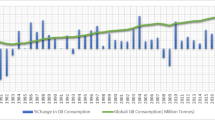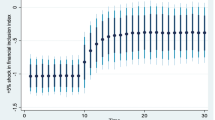Abstract
This study investigates the contribution of external factors to Nigeria’s economic growth. To achieve the study objectives, we divide external indicators into two categories: the goods market and financial capital inflows market, using annual frequency time-series data over the period 1980–2019. Using the autoregressive distributed lag bounds testing model for empirical estimation, results confirm the financial capital inflows-led growth hypothesis. At the same time, the goods market contributes insignificantly to economic growth and environmental degradation both in the short run and in the long run. From a policy standpoint, we think that to promote sustainable economic growth in the region, government and policymakers (1) must properly channel capital inflows and pursue an all-inclusive foreign direct investment policy that will not isolate a particular sector of the economy, (2) may need to reconsider the reliance on FDI and trade openness as primary drivers of economic growth. Instead, efforts could be directed towards diversifying economic strategies to explore alternative avenues for sustainable growth. Thus, continuous monitoring and evaluation of economic policies and their impacts are essential. Policymakers should regularly assess the effectiveness of FDI and trade policies in driving economic growth and be prepared to adapt strategies based on empirical evidence and changing economic dynamics.

Similar content being viewed by others
Data availability
The data supporting this study's findings are available from the corresponding author upon reasonable request.
References
Abdouli M, Hammami S (2017) The impact of FDI inflows and environmental quality on economic growth: an empirical study for the MENA countries. J Knowl Econ 8(1):254–278
Abubakar IS, Akadiri SS (2022) Revisiting oil rents-output growth nexus in Nigeria: evidence from dynamic autoregressive distributive lag model and kernel-based regularized least squares approach. Environ Sci Pollut Res 29(30):45461–45473
Afaha JS, Njogo BO (2012) Trade openness and its effect on the Nigerian economy (1970–2010). Oman Chapter Arab J Bus Manag Rev 34(970):1–24
Akadiri AC, Gungor H, Akadiri SS, Bamidele-Sadiq M (2020) Is the causal relation between foreign direct investment, trade, and economic growth complement or substitute? The case of African countries. J Public Aff 20(2):e2023
Akadiri SS, Adebayo TS, Nakorji M, Mwakapwa W, Inusa EM, Izuchukwu OO (2022) Impacts of globalization and energy consumption on environmental degradation: What is the way to achieve environmental sustainability targets in Nigeria? Environ Sci Pollut Res 29(40):60426–60439
Almfraji MA, Almsafir MK (2014) Foreign direct investment and economic growth literature review from 1994 to 2012. Procedia Soc Behav Sci 129:206–213
Alsamara M, Mrabet Z, Barkat K, Elafif M (2019) The impacts of trade and financial developments on economic growth in Turkey: ARDL approach with structural break. Emerg Mark Financ Trade 55(8):1671–1680
Apinran MO, Usman N, Akadiri SS, Onuzo CI (2022) The role of electricity consumption, capital, labour force, carbon emissions on economic growth: implication for environmental sustainability targets in Nigeria. Environ Sci Pollut Res 29(11):15955–15965
Azharuddin SM, Paramanik RN (2014) Revisiting growth-export nexus of Indian economy. Asian J Res Soc Sci Human 4(4):61–73
Bornschier V, Chase-Dunn C (1985) Transnational corporations and underdevelopment. Praeger, New York
Brückner, M., & Lederman, D. (2012). Trade causes growth in sub-Saharan Africa. The World Bank.
Chenery, H. B. (1967). Foreign assistance and economic development. In Capital movements and economic development (pp. 268–292). Palgrave Macmillan, London.
Dickey DA, Fuller WA (1979) Distribution of the estimators for autoregressive time series with a unit root. J Am Stat Assoc 74(366a):427–431
Goh SK, Sam CY, McNown R (2017) Re-examining foreign direct investment, exports, and economic growth in Asian economies using a bootstrap ARDL test for cointegration. J Asian Econ 51:12–22
Guei KM, le Roux P (2019) Trade openness and economic growth: Evidence from the economic community of Western African states region. J Econ Financ Sci 12(1):1–9
Güngör H, Ringim SH (2017) Linkage between foreign direct investment, domestic investment and economic growth: evidence from Nigeria. Int J Econ Financ Issues 7(3):97–104
Güngör H, Katircioglu S, Mercan M (2014) I am revisiting the nexus between financial development, FDI, and growth: New evidence from second-generation econometric procedures in Turkish. Acta Oeconomica 64(1):73–89
Gungor H, Katircioglu ST (2010) Financial development, FDI and real income growth in Turkey: an empirical investigation from the bounds tests and causality analysis. Actual Problems of Econ 11(114):215–225
Hozouri N (2017) The effect of trade liberalization on economic growth: selected MENA countries. Int J Econ Financ 9(1):88–95
Jadoon TK, Rashid HA, Azeem A (2015) Trade liberalization, human capital and economic growth: empirical evidence from selected Asian countries. Pakistan Econ Soc Rev 1:113–132
Joshua U (2019) An ARDL approach to the government expenditure and economic growth nexus in Nigeria. Acad J Econ Stud 5(3):152–160
Joshua U (2020) Accounting for the determinants of FDI inflow in Nigeria amidst global oil price shock and economic recession. Acad J Econ Studies 6(3):30–38
Joshua U, Salami OM, Alola AA (2020) Toward the path of economic expansion in Nigeria: the role of trade globalization. J Labor Soc 23(2):205–220
Joshua U, Uzuner G, Bekun FV (2020) Revisiting the causal nexus between coal energy consumption, economic growth, and pollutant emission: sorting out the causality. Environ Sci Pollut Res 27:30265–30274
Kalai M, Zghidi N (2019) Foreign direct investment, trade, and economic growth in MENA countries: empirical analysis using ARDL bounds testing approach. J Knowl Econ 10(1):397–421
Kalu, E. U., Nwude, C. E., & Nnenna, N. (2016). Does trade openness engineer economic growth in Nigeria? (Empirical evidence covering 1991 to 2013). Global Journal of Management and Business Research.
Keho Y (2017) The impact of trade openness on economic growth: the case of Cote d’Ivoire. Cogent Econ Finance 5(1):1332820
Khobai H, Kolisi N, Moyo C (2018) The relationship between trade openness and economic growth: the case of Ghana and Nigeria. Int J Econ Financ Issues 8(1):77
Kwiatkowski D, Phillips PC, Schmidt P, Shin Y (1992) We are testing the null hypothesis of stationarity against the alternative of a unit root. J Econ 54(1–3):159–178
Manni UH, Afzal MNI (2012) Effect of trade liberalization on economic growth of developing countries: a case of Bangladesh economy. J Bus Econ 1:2
Mature, P. (2019). Trade liberalization and economic growth in Zimbabwe (Doctoral dissertation).
Maune A (2019) Trade in services-economic growth nexus: an analysis of the growth impact of trade in services in SADC countries. J Econ Behav Stud 13(11):58–78
Millikan MF, Rostow WW (1957) A proposal: key to an effective foreign policy
Musa N, Izuchukwu OO, Saint Akadiri S (2024) Assessment of exchange rate determination in a mono-resource economy: a case of Nigeria. J Econ Anal 3(2):101–120
Nath HK (2009) Trade, foreign direct investment, and growth: evidence from transition economies. Compar Econ Stud 1(51):20–50
Nurudeen, A., Obi, B., Wafure, G. O., Jimaza, M., Abdullahi, U., & Gana, U. (2012). Trade Openness-Economic Growth Nexus: Empirical Evidence from Nigeria. Economic Journal of Nepal, 35(3).
Odishika, V. A. (2017). Development economics I. Lagos: National Open University of Nigeria (NOUN).
Ogujiuba K, Omoju O (2013) Is growth in nigeria inclusive? A cointegration analysis. Int J Econ Bus Law 2(4):8–29
Olaifa FG, Subair K, Biala MI (2013) Trade liberalization and economic growth in Nigeria; a Cointegration analysis. J Bus Econ 2:3
Olajide, O. T. (2004). Theories of Economic Development and Planning. Lagos: Pumark Nigeria Ltd.
Olubiyi EA (2014) Trade, remittances and economic growth in Nigeria: any causal relationship? Afr Dev Rev 26(2):274–285
Omri A, Kahouli B (2014) Causal relationships between energy consumption, foreign direct investment and economic growth: fresh evidence from dynamic simultaneous-equations models. Energy Policy 1(67):913–922
Osang, T. (2006). External and internal determinants of development. Federal Reserve Bank of Dallas Proceedings, pp. 35–59.
Pandya V, Sisombat S (2017) Impacts of foreign direct investment on economic growth: empirical evidence from australian economy. Int J Econ Financ 9(5):121
Parsons T (1971) The system of modern societies. Englewood Cliffs, NJ: Prentice-Hall
Pesaran MH, Shin Y, Smith R (2001) Bounds testing approaches to the analysis of the level relationships. J Appl Econ 16:289–326.
Pradhan RP, Arvin MB, Hall JH (2019) The nexus between economic growth, stock market depth, trade openness, and foreign direct investment: the case of ASEAN countries. Singap Econ Rev 64(3):461–493.
Rahman MM, Mamun SAK (2016) Energy use, international trade and economic growth nexus in Australia: New evidence from an extended growth model. Renew Sustain Energy Rev 64:806–816
Rani R, Kumar N (2019) On the causal dynamics between economic growth, trade openness and gross capital formation: evidence from Brics countries. Glob Bus Rev 20(3):795–812
Rodrik, A. (2006). External and Internal Determinants of Development. Migration, Trade, and Development, p. 37.
Rosenstein-Rodan PN (1961) International aid for underdeveloped countries. Rev Econ Stat 43(2):107–138
Saint Akadiri S, Akadiri AC (2018) Growth and inequality in Africa: reconsideration. Acad J Econ Stud 4(3):76–86
Sarkodie, S. A., & Strezov, V. (2019). Effect of foreign direct investments, economic development and energy consumption on greenhouse gas emissions in developing countries. Science of the Total Environment.
Shahbaz M, Rahman MM (2012) The dynamic of financial development, imports, foreign direct investment and economic growth: cointegration and causality analysis in Pakistan. Glob Bus Rev 13(2):201–219
Sokhanvar A (2019) Does foreign direct investment accelerate tourism and economic growth within Europe? Tourism Manag Perspect 29:86–96
Solmaz, S., & Taheri Sanjani, M. (2015). How external factors affect the domestic economy:
Sunde T (2017) Foreign direct investment, exports and economic growth: ADRL and causality analysis for South Africa. Res Int Bus Finance 1(41):434–444
Tang VT, Tregenna F, Dikgang J (2019) Trade openness and economic growth in Mauritius. In: Development and sustainable growth of Mauritius, pp. 69–104
The World Bank (2018) World Development Indicators: Washington DC. https://data.worldbank.org/indicator
Tshepo M (2014) The impact of foreign direct investment on economic growth and employment in South Africa: a time series analysis. Mediterr J Soc Sci 5(25):18
Umer F (2014) Impact of trade openness on the economic growth of Pakistan: an ARDL approach. J Bus Econ Policy 1(1):2014
Vamvakidis A (2002) How robust is the growth-openness connection? Historical evidence. J Econ Growth 7(1):57–80
Yusuf, M., Malarvizhi, C. A., & Khin, A. (2013). Trade liberalization, economic growth, and poverty reduction
Zandile, Z., & Phiri, A. (2019). FDI contributes to economic growth in Burkina Faso: How true is this? Global Economy Journal
Funding
The authors did not receive funding for the study.
Author information
Authors and Affiliations
Corresponding author
Ethics declarations
Conflict of interest
There is no conflict of interest for this submission.
Ethical approval
The authors mentioned in the manuscript have agreed to authorship, read and approved the manuscript, and given consent for submission and subsequent publication.
Consent to participate
Not Applicable.
Consent to publish
Not Applicable.
Additional information
Publisher's Note
Springer Nature remains neutral with regard to jurisdictional claims in published maps and institutional affiliations.
The contents of this paper are authors’ sole responsibility. They do not represent the views of any of the institutions.
Rights and permissions
Springer Nature or its licensor (e.g. a society or other partner) holds exclusive rights to this article under a publishing agreement with the author(s) or other rightsholder(s); author self-archiving of the accepted manuscript version of this article is solely governed by the terms of such publishing agreement and applicable law.
About this article
Cite this article
Joshua, U., Akadiri, S.S., Sarkodie, S.A. et al. Accounting for sustainable economic growth in Nigeria: the role of external factors. J. Soc. Econ. Dev. (2024). https://doi.org/10.1007/s40847-024-00336-6
Published:
DOI: https://doi.org/10.1007/s40847-024-00336-6




